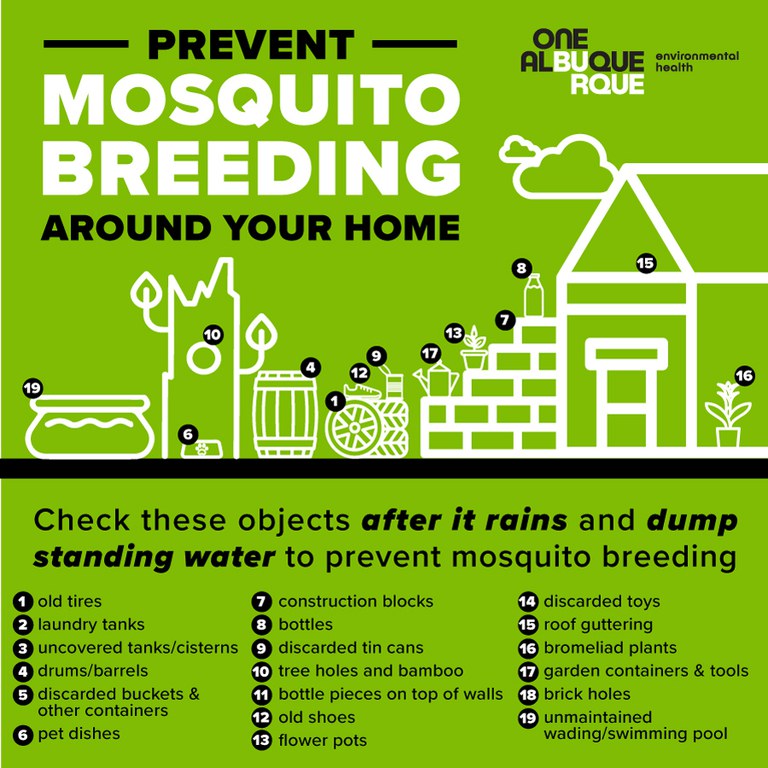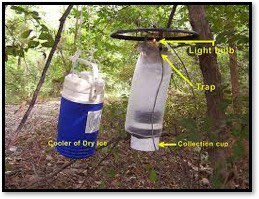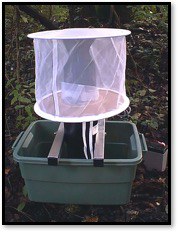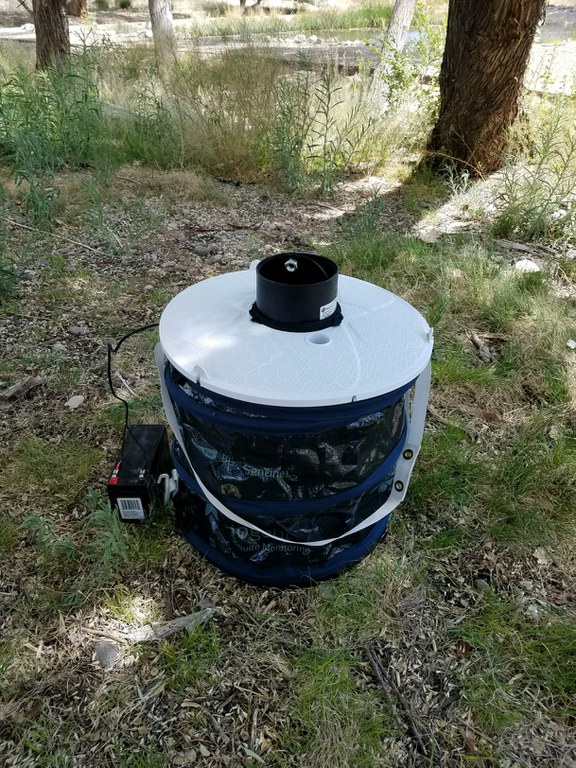Mosquitoes
Mosquito Control Program
Reporting Mosquito Habitat
- Call 311 if you see any mosquito habitats or potential breeding sites
- 311 takes requests for mosquito control from Albuquerque and Bernalillo County residents.
- Allowing conditions favorable to mosquito breeding is prohibited under state and local ordinance; standing water must be prevented, drained or treated to ensure that mosquitoes are not breeding. Remember, drain and cover open containers!
- Mosquitoes breed in shallow, stagnant water such as ponding areas, swimming pools that are not maintained, empty containers holding water, etc.
- Properties in violation of these laws, or other areas of standing water should be reported so that vector control technicians can enforce compliance and abate mosquito breeding.
Mosquitoes Around Your Home
Prevent mosquito breeding around your home. Check these objects after it rains and dump standing water to prevent mosquito breeding:

Mosquito Services
Types of mosquito treatment are dependent on individual circumstances and determined based on the type of issue and on a case by case basis. Call 311 to report a mosquito issue in your area. This can include standing water issues, unmaintained swimming pools, or excessive numbers of mosquitoes in an area.
Registering for the No-Spray List
- To register for the no-spray list, call 311.
- Residents who don't want their property sprayed can register for the No-Spray List.
- Recommended for those who keep bees on their property or manage/maintain organic certified farms
- A buffer is maintained around the property as a no-spray area. This list is specifically maintained as part of the mosquito control program; other pesticides may be applied in the area by different agencies for different purposes.
Obtaining Mosquitofish
UPDATE: Mosquitofish are not currently being distributed to vendors during Summer 2023. When mosuqitofish become available, the vendor list will be updated. Those interested in obtaining mosquitofish should call 311.
- Mosquitofish eat mosquito larvae as part of their typical diet.
- Mosquitofish can be used in ditches, ornamental ponds, bird baths, watering troughs or retention ponds to control mosquito breeding.
- Most efficient when they are placed in permanent structures where they can survive from season to season.
- Distribution by the City of Albuquerque is typically from June through September.
- Mosquitofish are distributed for free at designated distribution centers.
- Call ahead to make sure the distributor near you has mosquitofish in stock.
- Mud Monsters Landscape Supply
5101 Edith Blvd NE
505-217-2856 - Plant World
250 El Pueblo Rd NE
505-898-9627 - Just Sprinklers Montgomery
9140 Montgomery Blvd NE - Just Sprinklers Bogan
4500 Bogan Ave NE - Just Sprinklers Coors
9170 Coors Blvd NW
- Mud Monsters Landscape Supply
Mosquito Surveillance
Have you seen these in or around your neighborhood?



No need for alarm, these are mosquito traps used in the mosquito surveillance and disease testing program.
- Trapping season is from May through October
- There are 21 sites throughout Bernalillo County concentrated near the Rio Grande
- Allows for detection of high populations of mosquitoes
- West Nile Virus tests are performed on species capable of disease transmission
Mosquito-borne Disease
West Nile Virus (WNV)
- WNV is most commonly transmitted to humans through the bite of a mosquito (Culex quinquefasciatus and Culex tarsalis).
- WNV is established as a seasonal epidemic in North America that flares up in the summer and continues into fall. In the southern climates where temperatures are milder, West Nile virus can be transmitted year-round.
Symptoms
- A majority of infected people (70-80%) do not show signs or symptoms of infection
- 1 in 5 infected people will develop mild symptoms which include:
- Fever
- Headache
- Body aches
- Joint pain
- Vomiting
- Diarrhea
- Rash
- Less than 1% of infected people will develop sever symptoms associated with encephalitis or meningitis which include:
- High fever
- Headache
- Neck stiffness
- Disorientation
- Coma
- Tremors
- Seizures
- Paralysis
*Individuals over 60 years old or those who are already immunocompromised are at greater risk for sever symptoms.
Prevention
- The City of Albuquerque has a joint program with Bernalillo County for mosquito control.
- Call 311 to report high mosquito population areas and standing water in your neighborhood.
- Use insect repellents containing DEET when outdoors. Always follow the direction on the product.
- Avoid outdoor activities during dusk and dawn when mosquitoes are most active.
- If unavoidable, use repellents, wear long sleeves and pants
- Keep your property free of mosquito breeding habitat
- Empty standing water containers on a regular basis, even pet dishes and bird baths, remember the phrase: drain and cover!
For More Information Visit:
Zika Virus
- Zika virus is most commonly spread through the bite of a mosquito.
- The mosquito responsible for disease transmission, Aedes aegypti was detected in Albuquerque in 2018 and again in 2019.
- Aedes aegypti, the yellow fever mosquito is attributed to the spread of diseases like Zika, Dengue, and Chikungunya. However, there is currently no disease transmission in New Mexico.
- The Urban Biology division performs active surveillance to determine the range of these mosquitoes in Bernalillo County.
- Zika can also be spread by:
- Mother to fetus
- Unprotected sex
- Blood transfusion
- Laboratory/healthcare exposure
Symptoms
- Many people will not show symptoms or will only show mild symptoms
- Fever
- Rash
- Headache
- Joint Pain
- Conjunctivitis (red eyes)
- Muscle Pain
- See a doctor if you exhibit these symptoms and have been to an area with a risk of Zika, this is especially important if you are pregnant
Prevention
- Plan ahead when traveling to Zika risk areas
- Mosquitoes that carry Zika are active during the day; not just dusk and dawn. Use insect repellents containing DEET when outdoors. Always follow the direction on the product.
For More Information Visit:
Heartworm
Dirofilaria immitis, the dog heartworm is a parasitic roundworm that invades the heart and lungs of its host. Although uncommon; cats can also become infested.
Heartworms are transmitted from one animal to another through the bite of a mosquito
Symptoms
- Collapse
- Difficulty breathing
- Convulsions
- Diarrhea/vomiting
- Blindness
- Coughing
- Lethargy
- Lack of appetite
- Sudden death
Prevention
Visit your veterinarian and have your dog tested. Dogs should be on heartworm prevention medication year-round.
